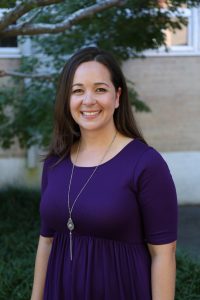1. Given your recent move from Houston, Texas, are you experiencing any culture shock here in Greenville, NC? What is your favorite thing about Houston, Texas? Is there any substitute for that in Greenville?
I moved from one southern state to another, so I have experienced the same level of hospitality and friendliness. The biggest shock for me was not having as many options for shopping and eating out. I really miss the restaurants in Houston. Since Houston is one of the most diverse cities in the nation, I was able to eat cuisines from all over the world. I have found a few restaurants in the Greenville area that are amazing, such as Villa Verde and Anchalee, and I am continuing to explore more.
2. What are the three (four or five) most important lessons you learned as a mathematics teacher?
- Not every student will think about and solve mathematics problems in the same way, and that’s ok!
- Getting students to talk during mathematics class can be beneficial to everyone in the class. They can learn from one another, question each other’s ideas, defend their own ideas, and build a common understanding of the task.
- English proficiency is not the same as mathematics proficiency. Students can learn both at the same time and be very successful!
Fast does not mean best. - There are multiple ways for students to be “smart” at mathematics.
3. What are the three (four or five) most important lessons you learned as a school administrator?
- The teacher is the number one factor in a student’s academic success. Continuous professional development for teachers that are relevant and accompanied with timely feedback will help the teacher be successful, which in turn helps the students be successful.
- Ability oriented thinking about teachers, students, and parents helps to frame situations differently, especially in difficult circumstances.
- Timely communication is very important.
- Spending time with students is the most rewarding part of the day.
4. What is the purpose of the Community for Advancing Discovery Research in Education (CADRE)? What are some of the activities in which you engaged as a CADRE fellow? How did you benefit from participating in those activities?
CADRE is a network for STEM education researchers funded by the National Science Foundation’s (NSF) Discovery Research PreK-12 (DRK-12) program. CADRE connects these researchers who are endeavoring to improve STEM education in and outside our schools. The CADRE fellowship is a DRK-12 funded program that is designed as a capacity building experience for early career researchers and developers.
As a CADRE fellow, I had the opportunity to work directly with NSF program officers to engage in a facilitated mock proposal review session. I also built relationships with researchers in the field that I continue to keep in contact with. I also received guidance on career opportunities, publishing, and grant writing. This benefited me by having a built in support system during the job search process, having peers provide feedback on my writing, and having some background knowledge on submitting a DRK-12 proposal.
5. In light of your research and teaching experience, what instructional practices foster development of a positive mathematical identity?
- Encouraging all students to actively participate during class.
- Developing a classroom environment in which collaboration and risk taking are encouraged and rewarded.
Celebrate mistakes and incorrect answers as sources for learning. - Holding high expectations of all students.
- Picking or designing tasks that promote student persistence and reasoning during problem solving.
6. How can teachers and parents excite children about mathematics?
Teachers can design mathematics instruction that is interactive, complex, and connected to students’ lives. This will encourage students to engage in discussions, collaborate, model, and make connections.
Parents can encourage their children to use mental math and describe their methods. They can even make this into a game to see if multiple mental math strategies can be developed. Math can also be integrated into lots of daily activities such as shopping, cooking, driving, and watching sports.
7. Why is equitable teaching of special importance to you? What instructional practices favor equitable teaching? How do you plan to help students in mathematics education develop equitable teaching practices?
Teachers are the number one determinant of students’ academic success, which positions teachers as very powerful. When these teachers deliberately choose to teach in ways that acknowledge and address factors that contribute to differential outcomes among groups of students, then they ensure that all students routinely have opportunities to experience high quality instruction and receive the support necessary to be successful.
Some equitable mathematics teaching practices include:
- Going deep with the mathematics
- Leveraging multiple mathematics competencies
- Affirming learners’ mathematics identities
- Challenging spaces of marginality
- Drawing on multiple resources of knowledge
I will provide my teacher candidates with opportunities to reflect on their own identities as mathematics learners and teachers in order for them to articulate their visions of high quality equitable mathematics instruction. I will then design performance assessments in order to evaluate and provide specific feedback on their development of high leverage teaching practices. My goal is for my teacher candidates to enter their first year of teaching ready to teach every student high quality mathematics.
